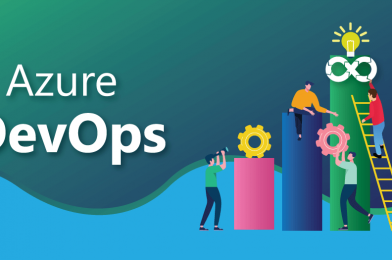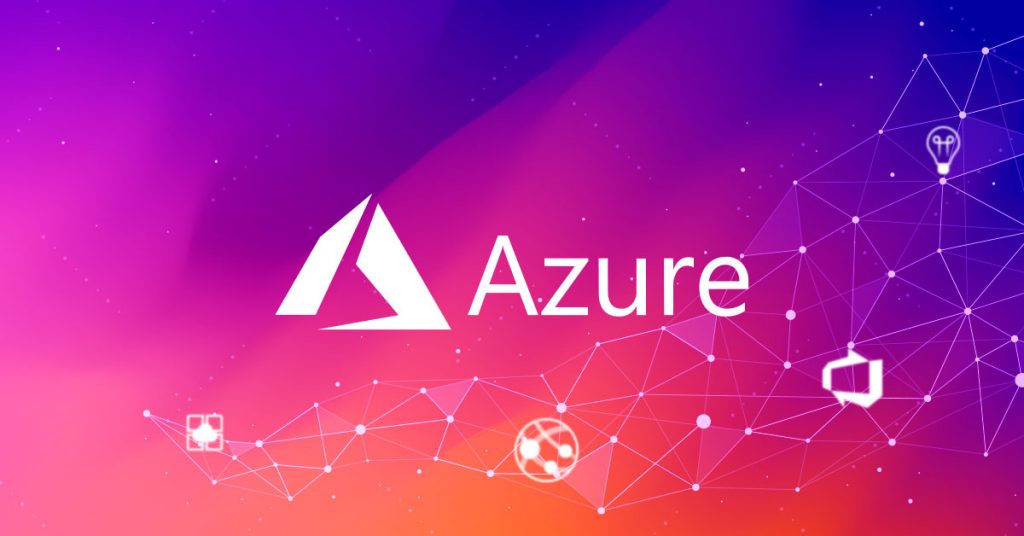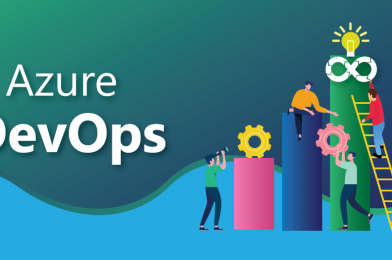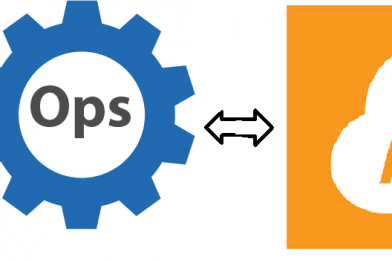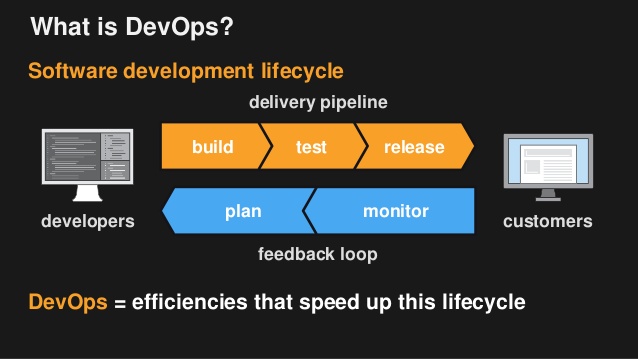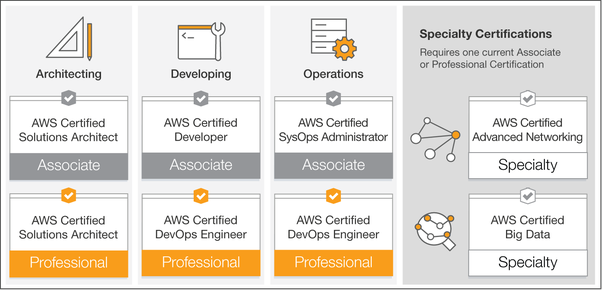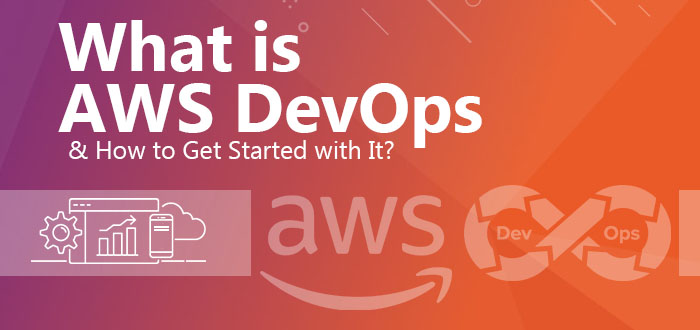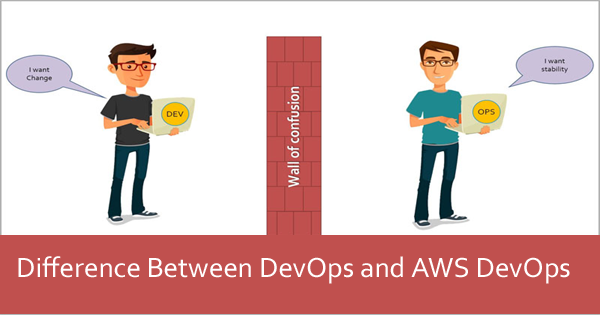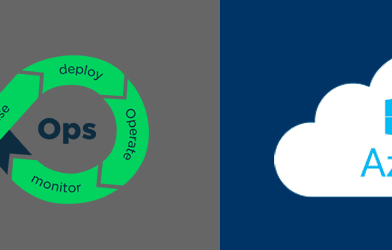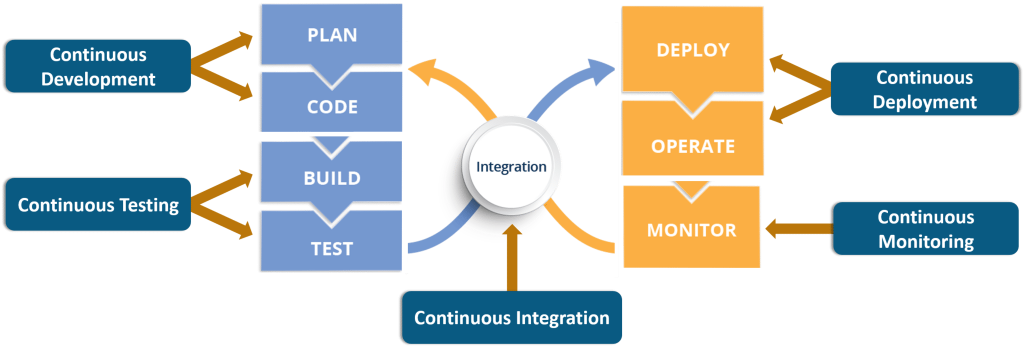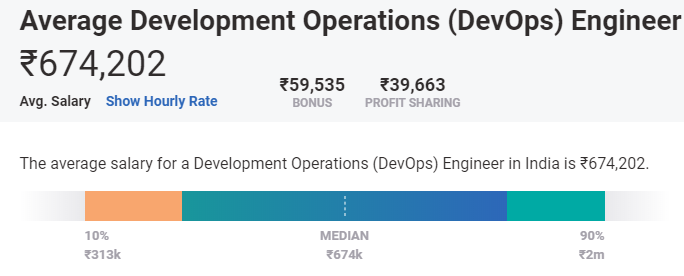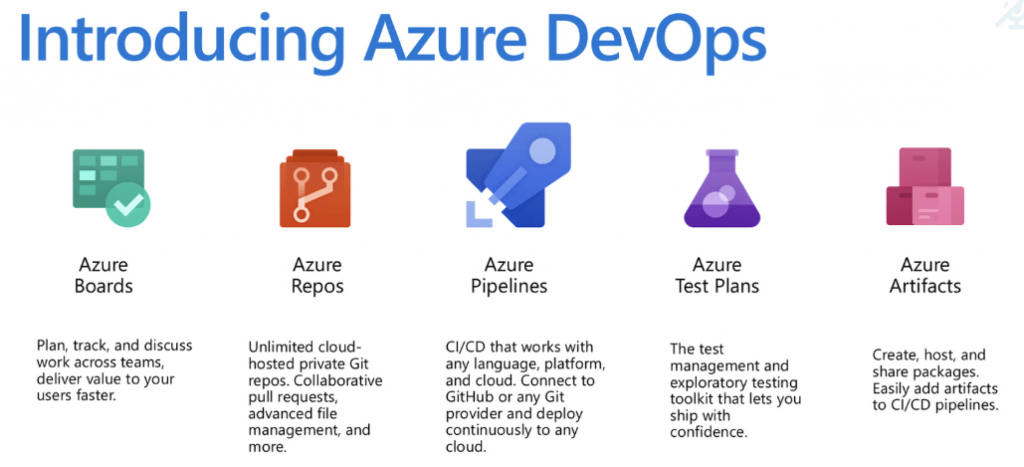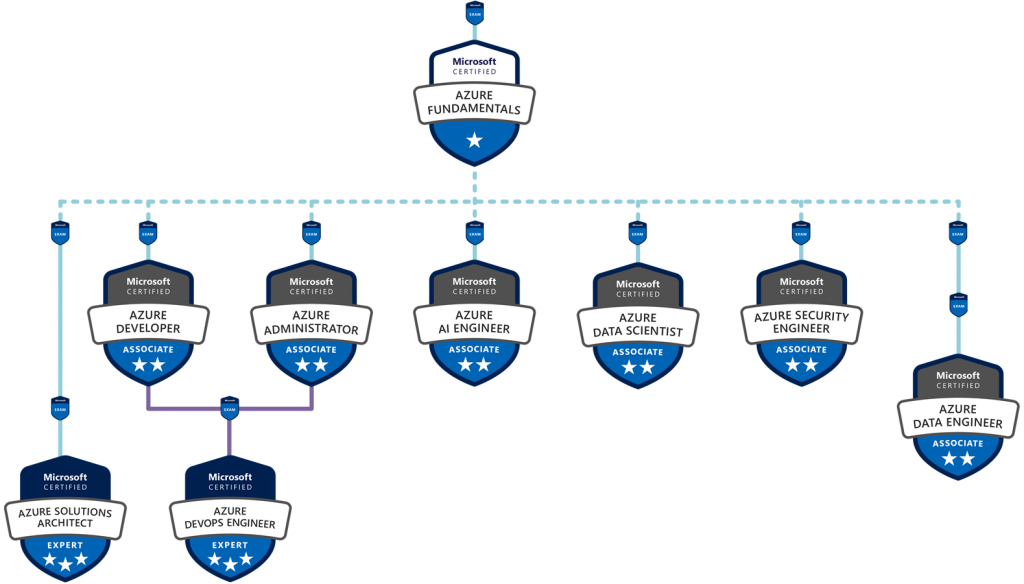Introduction
Software Development Life Cycle (SDLC) may be a method employed by the software industry to style, develop and check high-quality software. The SDLC aims to supply high-quality software that meets or exceeds client expectations, reaches completion among times and price estimates.

SDLC is that the acronym of Software Development Life Cycle.
It is conjointly referred to as the software development method.
SDLC may be a framework process task performed at every step within the software development method.
ISO/IEC 12207 is a world quality software life-cycle process. It aims to be the quality that defines all the tasks needed for developing and maintaining software.
What is Software Development Lifecycle (SDLC)?
The software Development Life Cycle (SDLC) could be a structured method that permits the assembly of high-quality, low-priced software, within the shortest attainable production time. The goal of the SDLC is to provide superior software that meets and exceeds all client expectations and demands.
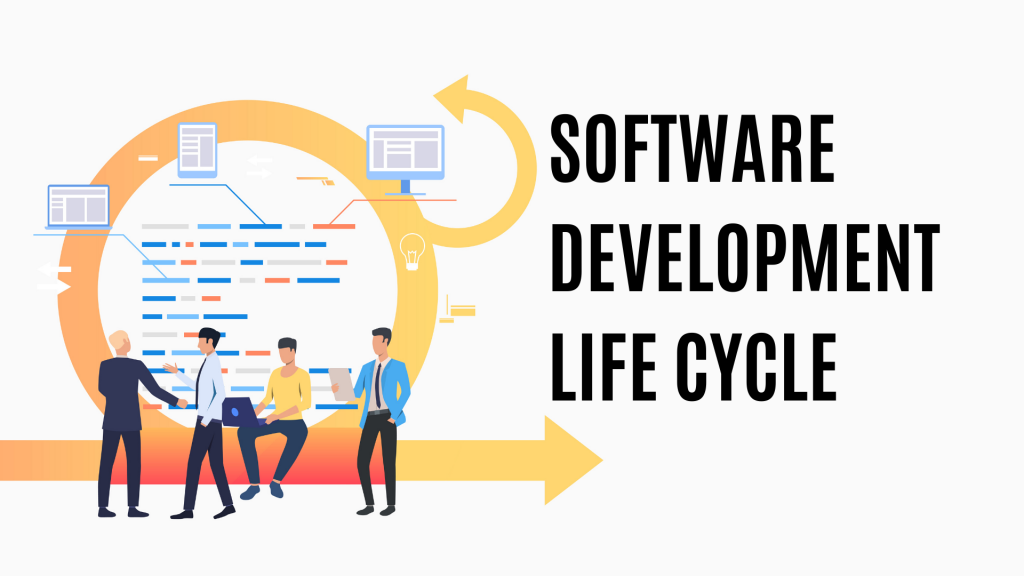
SDLC may be a method followed for a software project, inside a software organization. It consists of an in-depth setup describing the way to develop, maintain, replace and alter or enhance specific software. The life cycle defines a strategy for improving the standard of software and also the overall development method.
Why SDLC is important for developing a software system?
SDLC permits developers to research the necessities. It helps in reducing unnecessary prices throughout development. It allows developers to style and builds high-quality software products. This can be as a result of them following a scientific method that permits them to check the software before it’s extended.
- Forms the foundation for project planning and scheduling
- Helps estimate cost and time
- Includes the project activities and deliverables of each phase
- Boosts the transparency of the entire project and the development process
- Enhance the speed and accuracy of development
- Minimizes the risk potential and maintenance during any given project
- Its defined standard improves client relations
What are the Benefits of the Software Development Lifecycle?
- It makes it clear what the problem or goal is. It is easy to get ahead of yourself when taking on a large project. With the SDLC you can clearly see the goals and the problems so that the plan is implemented with precision and relevance.
- The project is designed with clarity. Project members cannot move from one stage to another until the prior stage is completed and signed off on by the project manager. A formal review is created at the end of each stage, which allows the project manager to have maximum management control.
- It will be properly tested before being installed. The installation in a project that is executed using an SDLC has the necessary checks and balances so that it will be tested with precision before entering the installation stage.
- If a key project member leaves, a new member can pick up where they left off. The SDLC gives you a well-structured and well-documented paper trail of the entire project that is complete with records of everything that occurs.
- Without the SDLC, the loss of a project member will set you back and probably ruin the project. If paperwork is missing or incomplete, the new project member can have to be compelled to begin from the start and even probably amendment the project to create sense of it. With a well-designed SDLC, everything is so as in order that a replacement project member will continue the method while not complications.
- The project manager will properly manage a project if deliverables are completed on time and among the budget. sticking to a budget is simpler with a well-organized arrange during which you’ll see all the timetables and prices. Project members will submit their work to an integrated system that flags something that’s past due. Once the project manager will pay less time micromanaging, he or she will be able to pay longer improving potency and production.
- The project can continuously loop around until it is perfect. The stages are meant to feed back into the earlier stages, so the SDLC model provides the project with flexibility.
- When designing and implementing a project, a software development life cycle is the solution. It’s the best way to ensure optimal control, minimize problems, and allow the project manager to run production without having to micromanage the project members.
Stages of the SDLC:
Every software development company goes through an array of stages as they embark on a systematic process of development. From planning to design and development, here is a brief glance at the six essential stages of SDLC required to create flawless software:
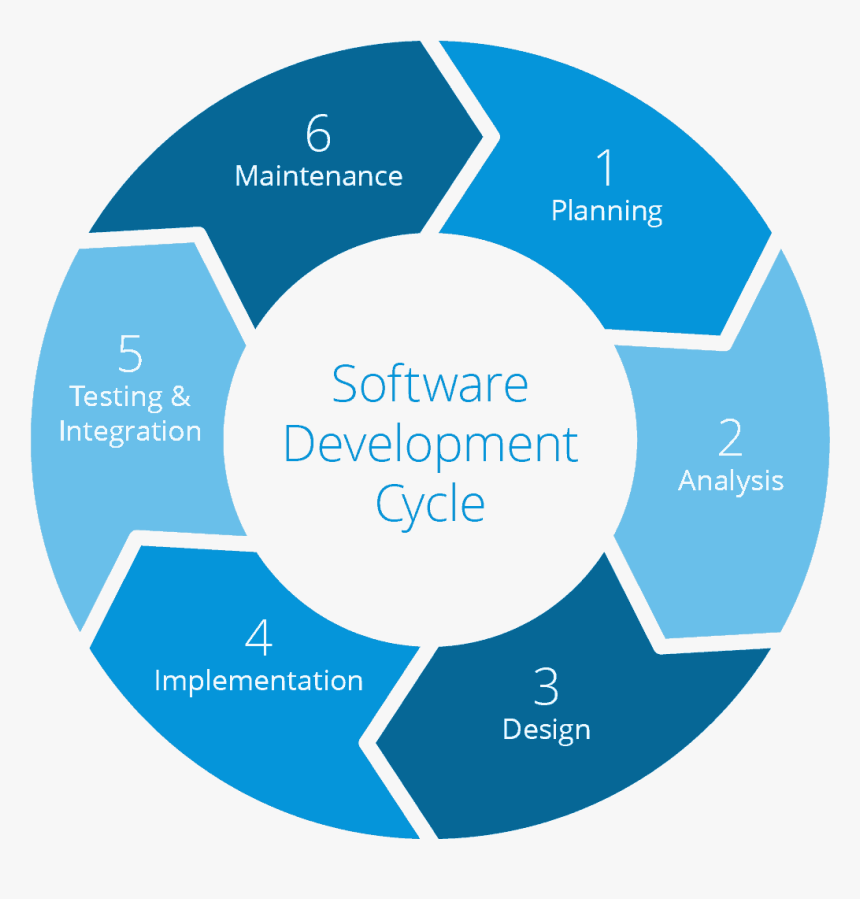
Planning
Without a clear, visionary plan in place, it is difficult to align everything with your project goals and judge all its strengths, scope, and challenges involved.
The planning is to ensure the development goes easy and smooth, meets its purpose, and achieves its desired progress within the given time limit.
Analysis
Analyzing the requirements and performance of the software through its multiple stages is key to deriving process efficiency.
Analysis always helps be in the know of where you exactly stand in the process and where you need to be and what it takes to pass through the next step down the path.
Design
After the analytical part is complete, the design is the next step that needs to look forward to. The basic aim in this phase is to create a strong, viable architecture of the software process.
As it works by standard adherence, it helps eliminate any flaws or errors that may possibly hinder the operation.
Development
Once the design is ready, the development takes over along with efficient data management and recording. This is a complicated phase where clarity and focus are of great significance.
Post-development, implementation comes into the picture to check whether or not the product functions as expected.
Testing
The testing phase that comes now is inevitable as it studies and examines the software for any errors and bugs that may cause trouble.
Maintenance
If the software has performed well through all the previous five steps, it comes to this final stage called maintenance. The product here is properly maintained and upgraded as and when needed to make it more adaptive to the target market.
How many SDLC models are there?
Today, there are more than 50 recognized SDLC models in use. None of them is perfect, and each brings its favorable aspects and disadvantages for a specific software development project or a team.
Waterfall
Through all development stages (analysis, design, coding, testing, deployment), the method moves in a very cascade model. Every stage has concrete deliverables and is strictly documented. The consecutive stage cannot begin before the previous one is totally completed. Thus, as an example, software needs cannot be re-evaluated any in development. There’s additionally no ability to check and take a look at the software until the last development stage is finished, which ends up in high project risks and unpredictable project results. Testing is usually rushed, and errors are expensive to repair.
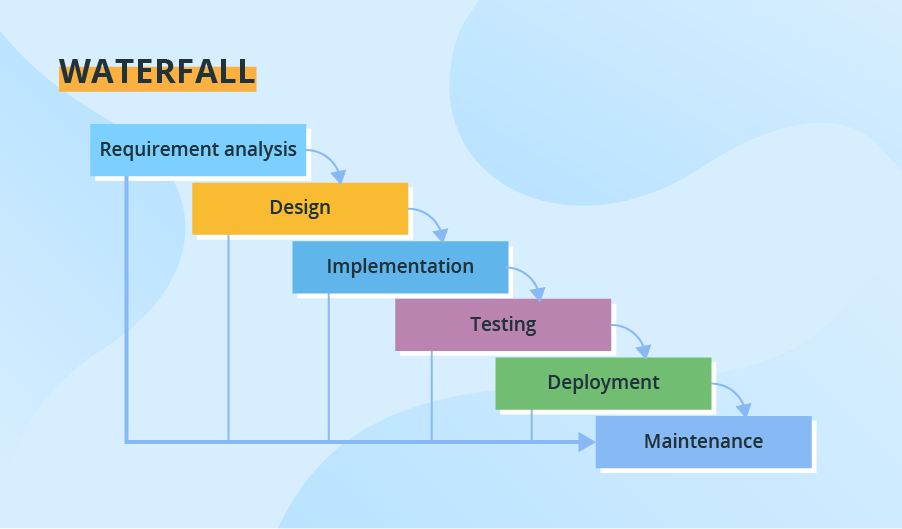
SDLC Waterfall model is used when:
- Requirements are stable and not changed frequently.
- An application is small.
- There is no requirement which is not understood or not very clear.
- The environment is stable
- The tools and techniques used is stable and is not dynamic
- Resources are well trained and are available.
V-model (Validation and Verification model)
The V-model is another linear model with every stage having a corresponding testing activity. Such workflow organization implies exceptional internal control, however, at constant time, it makes the V-model one among the foremost costly and long models. Moreover, although mistakes in needs specifications, code, and design errors will be detected early, changes throughout development are still costly and tough to implement. As within the waterfall case, all needs are gathered at the beginning and can’t be modified.
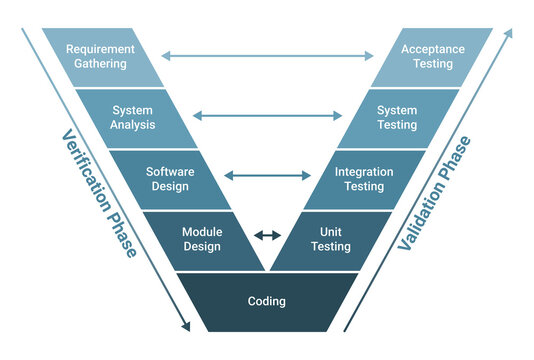
V model is applicable when:
- The requirement is well defined and not ambiguous
- Acceptance criteria are well defined.
- Project is short to medium in size.
- Technology and tools used are not dynamic.
Incremental and Iterative model
Incremental: An incremental approach breaks the software development process down into small, manageable portions known as increments.
Iterative: An iterative model means software development activities are systematically repeated in cycles known as iterations.
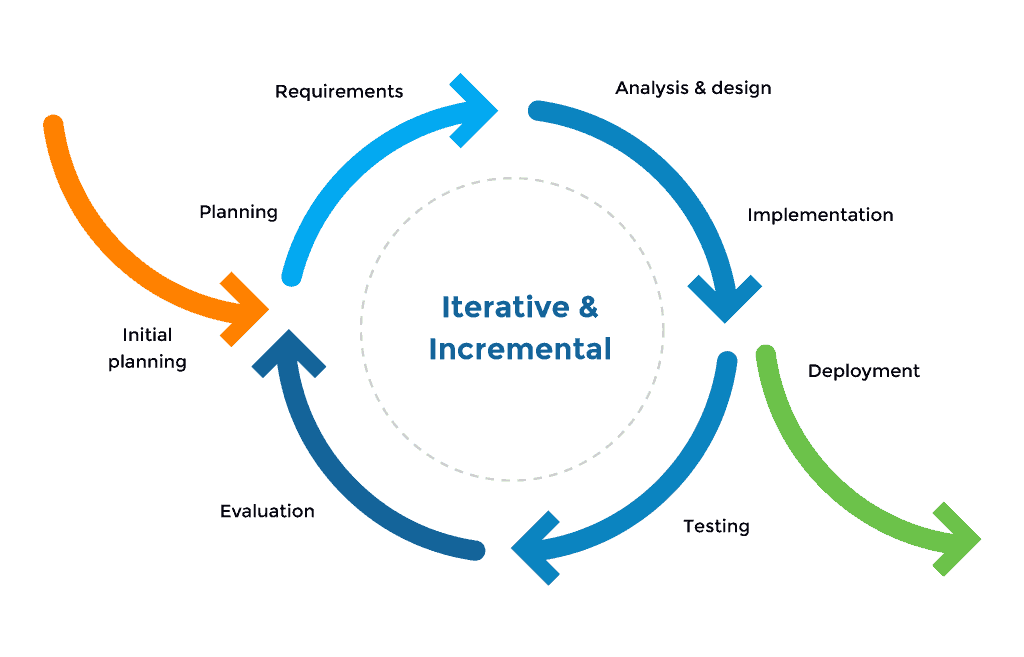
Use cases: Large, mission-critical enterprise applications that preferably consist of loosely coupled parts, such as microservices or web services.
Spiral model
The Spiral model puts concentrates on thorough risk assessment. Thus, to reap the advantages of the model to the fullest, you’ll have to be compelled to have interaction with people with a powerful background in risk evaluation. A typical Spiral iteration lasts around six months and starts with four important activities – thorough designing, risk analysis, prototypes creation, and evaluation of the antecedently delivered part. Continual spiral cycles seriously extend project timeframes.
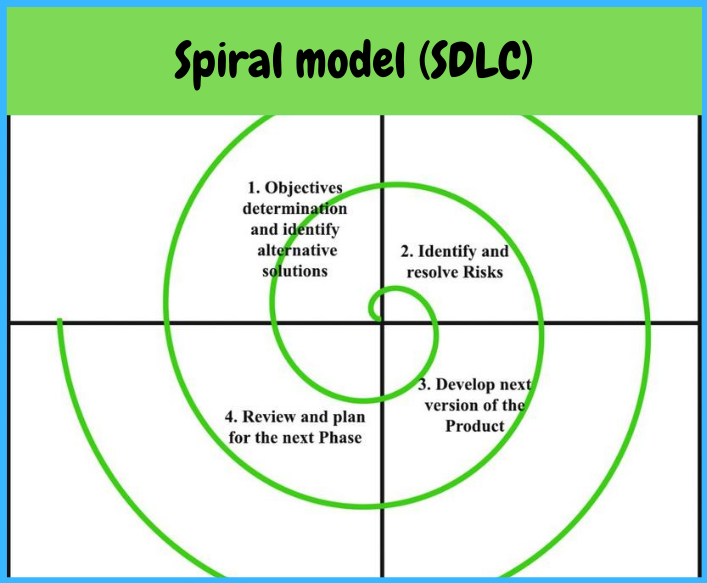
Uses of the spiral model:
- projects in which frequent releases are necessary;
- projects in which changes may be required at any time;
- long term projects that are not feasible due to altered economic priorities;
- medium to high risk projects;
- projects in which cost and risk analysis is important;
- projects that would benefit from the creation of a prototype; and
- projects with unclear or complex requirements.
The Rational Unified Process (RUP)
The Rational Unified Process (RUP) is also a mixture of linear and reiterative frameworks. The model divides the software development process into four phases – inception, elaboration, construction, and transition. Every phase however inception is typically done in many iterations. All basic activities (requirements, design, etc) of the development process are done in parallel across these four RUP phases, although with completely different intensities.
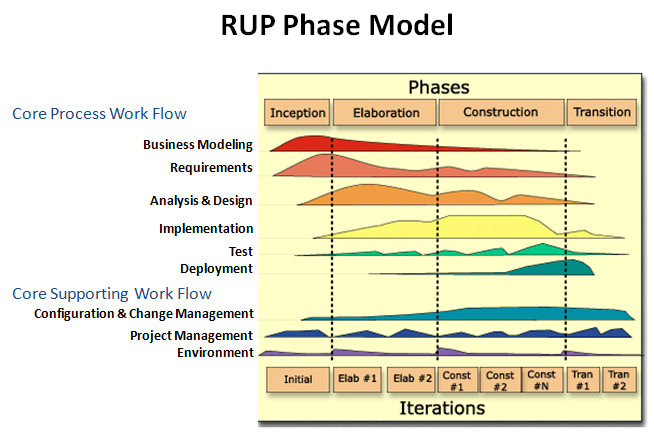
RUP helps to make stable and, at a similar time, versatile solutions, but still, this model isn’t as fast and adaptable because of the pure Agile cluster (Scrum, Kanban, XP, etc.). The degree of client involvement, documentation intensity, and iteration length could vary betting on the project wants.
Use cases: Large and high-risk projects, especially, use-case-based development and fast development of high-quality software.
Scrum
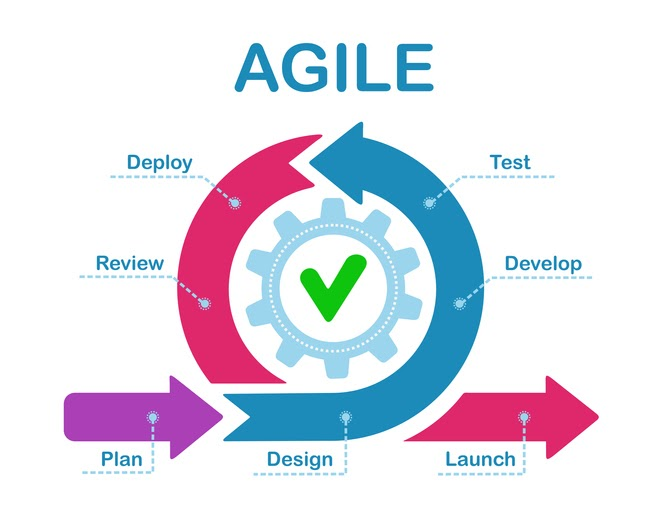
Scrum is probably the most popular Agile model. The iterations (‘sprints’) are usually 2-4 weeks long and they are preceded with thorough planning and previous sprint assessment. No changes are allowed after the sprint activities have been defined.
Extreme Programming (XP)
With Extreme Programming (XP), a typical iteration lasts 1-2 weeks. The model permits changes to be introduced even once the iteration’s launch if the team hasn’t begun to work with the relevant software piece yet. Such flexibility considerably complicates the delivery of quality software. To mitigate the matter, XP needs the utilization of try programming, test-driven development and test automation, continuous integration (CI), little releases, easy software style and prescribes to follow the coding standards.
Kanban
As for Kanban, its key distinguishing feature is that the absence of pronounced iterations. If used, they’re unbroken very short (‘daily sprints’). Instead, the emphasis is placed on arranged visualization. The team uses the Kanban Board tool that has a transparent illustration of all project activities, their variety, responsible persons, and progress. Such increased transparency helps to estimate the foremost urgent tasks a lot accurately. Also, the model has no separate strategy planning stage, thus a new modification request will be introduced at any time. Communication with the client is in progress, they’ll check the work results whenever they like, and therefore the meetings with the project team will happen even daily because of its nature, the model is usually employed in projects on software support and evolution.
What are the different phases of the SDLC life cycle?
I have explained all these Software Development Life Cycle Phases
- Requirement collection and analysis
The requirement is the first stage in the SDLC process. It is conducted by the senior team members with inputs from all the stakeholders and domain experts in the industry. Planning for the quality assurance requirements and recognization of the risks involved is also done at this stage.
2. Feasibility study
Once the requirement analysis phase is completed the next SDLC step is to define and document software needs. This process was conducted with the help of the ‘Software Requirement Specification’ document also known as the ‘SRS’ document. It includes everything which should be designed and developed during the project life cycle.
3. Design
In this third phase, the system and software design documents are prepared as per the requirement specification document. This helps define the overall system architecture.
This design phase serves as input for the next phase of the model.
There are two kinds of design documents developed in this phase:
High-Level Design (HLD)
- Brief description and name of each module
- An outline about the functionality of every module
- Interface relationship and dependencies between modules
- Database tables identified along with their key elements
- Complete architecture diagrams along with technology details
Low-Level Design(LLD)
- Functional logic of the modules
- Database tables, which include type and size
- Complete detail of the interface
- Addresses all types of dependency issues
- Listing of error messages
- Complete input and outputs for every module
4. Coding
Once the system design phase is over, the next phase is coding. In this phase, developers start to build the entire system by writing code using the chosen programming language. In the coding phase, tasks are divided into units or modules and assigned to the various developers. It is the longest phase of the Software Development Life Cycle process.
In this phase, the developer needs to follow certain predefined coding guidelines. They also need to use programming tools like compilers, interpreters, debuggers to generate and implement the code.
5. Testing
Once the software is complete, and it is deployed in the testing environment. The testing team starts testing the functionality of the entire system. This is done to verify that the entire application works according to the customer’s requirements.
During this phase, QA and testing team may find some bugs/defects which they communicate to developers. The development team fixes the bug and sends it back to QA for a re-test. This process continues until the software is bug-free, stable, and working according to the business needs of that system.
6.Installation/Deployment
Once the software testing phase is over and no bugs or errors are left in the system then the final deployment process starts. Based on the feedback given by the project manager, the final software is released and checked for deployment issues if any.
7. Maintenance
Once the system is deployed, and customers start using the developed system, the following 3 activities occur
Bug fixing – bugs are reported because of some scenarios which are not tested at all
Upgrade – Upgrading the application to the newer versions of the Software.
Enhancement – Adding some new features into the existing software.
Which SDLC Model is Best?
Agile is that the best SDLC methodology and conjointly one in every of the foremost used SDLC within the tech trade as per the annual State of Agile report. At RnF Technologies, Agile is that the most loved software development life cycle model. Here’s why. Agile is very adaptive that making it totally different from all alternative SDLC.
Conclusion
The software development life cycle is a resourceful tool for developing high-quality software products. This tool provides a framework for guiding developers in the process of software development. Organizations can use various SDLC strategies such as waterfall, V-model, iterative, spiral, and agile models.
You should consider consulting with a resourceful IT company before embracing an SDLC approach for your team from the list above.
DevOpsSchool has enough expertise to help you know how different models come in handy in certain business scenarios and industry environments. From our experience, we will guide you to the best fit for your software product.
